|
|
|
Sort Order |
|
|
|
Items / Page
|
|
|
|
|
|
|
| Srl | Item |
| 1 |
ID:
115794
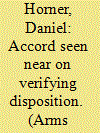

|
|
|
| 2 |
ID:
091402
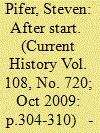

|
|
|
|
|
| Publication |
2009.
|
| Summary/Abstract |
The Obama administration regards a post-START treaty as the first step in a continuing process of nuclear arms reductions. But this will prove the last 'easy' nuclear arms control agreement between Washington and Moscow.
|
|
|
|
|
|
|
|
|
|
|
|
|
|
|
|
| 3 |
ID:
144425
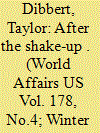

|
|
|
|
|
| Summary/Abstract |
The window for Washington to walk back some of its soaring rhetoric about Sri Lanka and instead focus on helping push the country toward real change is quickly closing.
|
|
|
|
|
|
|
|
|
|
|
|
|
|
|
|
| 4 |
ID:
099899


|
|
|
|
|
| Publication |
2010.
|
| Summary/Abstract |
America won an asymmetric war in Iraq and lost an asymmetric peace. Translating material power advantage into favourable political outcomes has been a challenge for great powers down the ages-what makes this bridge even more difficult to cross today is the raised expectations on the part of liberal publics about the moral purpose of US-led interventions. In this sense, Iraq is part of the explanation for why influential liberals believe there is a 'crisis' in America's world leadership. 'America after Iraq' subjects this claim to analytical scrutiny-in particular it addresses whether Iraq was simply a chapter in a longer book detailing American power and purpose in the post-9/11 world? In answering this question the article is drawn to consider conceptual debates about a shift in the international system from anarchy to hierarchy with the US as the hegemonic power. While it rejects strong versions of the hierarchy thesis that imply the Washington is the new Rome, it is nevertheless drawn to an understanding of a hierarchical form of ordering where the US oscillates between a hegemonic role and an imperial outlaw. Seen through this lens, the Iraq War was an intervention that happened because it could, and not because it was just or necessary. Public opinion and the weakness of domestic institutions are also critical factors in explaining how it was possible for a previously status-quo oriented hegemonic power to act recklessly and put the rules and institutions of international society under strain.
|
|
|
|
|
|
|
|
|
|
|
|
|
|
|
|
| 5 |
ID:
101893
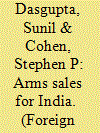

|
|
|
|
|
| Publication |
2011.
|
| Summary/Abstract |
With India planning to buy $100 billion worth of new weapons over the next ten years, arms sales may be the best way to revive Washington's relationship with New Delhi, its most important strategic partner in the region.
|
|
|
|
|
|
|
|
|
|
|
|
|
|
|
|
| 6 |
ID:
131312
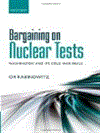

|
|
|
|
|
| Publication |
Oxford, Oxford University Press, 2014.
|
| Description |
xiv, 230p.Hbk
|
| Standard Number |
9780198702931
|
|
|
|
|
|
|
|
|
|
|
|
Copies: C:1/I:0,R:0,Q:0
Circulation
| Accession# | Call# | Current Location | Status | Policy | Location |
| 057786 | 355.825119/RAB 057786 | Main | On Shelf | General | |
|
|
|
|
| 7 |
ID:
141545
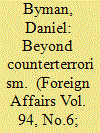

|
|
|
|
|
| Summary/Abstract |
When the Obama administration looks at the Middle East [2], it does so through the lens of counterterrorism. A systematic emphasis on the subject has underscored not just the administration’s relentless pursuit of al Qaeda and its new focus on the self-proclaimed Islamic State [3] (or ISIS) but also a wider swath of its foreign policy, from its drone campaign in northwestern Pakistan to its maintenance of the detention facility in Guantánamo Bay.
|
|
|
|
|
|
|
|
|
|
|
|
|
|
|
|
| 8 |
ID:
090945
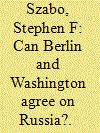

|
|
|
|
|
| Publication |
2009.
|
| Summary/Abstract |
Both Russia and Germany are back on the U.S. agenda. Russia will be a key element of a wide array of policies to the Obama administration, including dealing with Iran and the construction of a broader nonproliferation regime, energy security, nuclear arms reductions, and Afghanistan. Russia policy will also be central to U.S. designs for NATO, including how to deal with Georgia and Ukraine, and the viability of a pan-European security structure.
|
|
|
|
|
|
|
|
|
|
|
|
|
|
|
|
| 9 |
ID:
086807
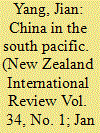

|
|
|
|
|
| Publication |
2009.
|
| Summary/Abstract |
China's influence in the South Pacific appears to be growing rapidly. China now has the largest number of diplomats in the region.It is observed that " It is now accepted routine that the first official overseas visit by a new head of government from the region is made to Beijing, not to Canberra, Washington or Wellington.
|
|
|
|
|
|
|
|
|
|
|
|
|
|
|
|
| 10 |
ID:
147106
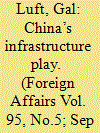

|
|
|
|
|
| Summary/Abstract |
Over the past three millennia, China has made three attempts to project its economic power westward. The first began in the second century BC, during the Han dynasty, when China’s imperial rulers developed the ancient Silk Road to trade with the far-off residents of Central Asia and the Mediterranean basin; the fall of the Mongol empire and the rise of European maritime trading eventually rendered that route obsolete. In the fifteenth century AD, the maritime expeditions of Admiral Zheng He [1] connected Ming-dynasty China [2] to the littoral states of the Indian Ocean. But China’s rulers recalled Zheng’s fleet less than three decades after it set out, and for the rest of imperial history, they devoted most of their attention to China’s neighbors to the east and south.
|
|
|
|
|
|
|
|
|
|
|
|
|
|
|
|
| 11 |
ID:
189446
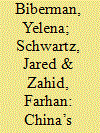

|
|
|
|
|
| Summary/Abstract |
Over the past eight years, Beijing drastically furthered its interests with the China-Pakistan Economic Corridor (CPEC) while reducing terrorism threats from AfPak-based groups. All this despite the repression of Muslim minority Uyghurs in the Pakistan-bordering Xinjiang region. What has been China’s security strategy in Pakistan? What lessons are there for the United States? Drawing on fieldwork in China and Pakistan, as well as interviews with Chinese, Pakistani, and US officials, journalists, and local experts, this article shows that Beijing’s security strategy in Pakistan rests on four pillars: (1) military invisibility; (2) economic visibility; (3) indiscriminate diplomacy, and (4) geopolitical alignment. This is the opposite of what has been Washington’s approach, which can be characterized as militarily visible, economically invisible, diplomatically selective, and generally at odds with Pakistan’s regional interests.
|
|
|
|
|
|
|
|
|
|
|
|
|
|
|
|
| 12 |
ID:
086329
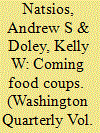

|
|
|
|
|
| Publication |
2009.
|
| Summary/Abstract |
The doubling of grain prices over the past years has already set off violent protests in over 30 developing counteries and led to the overthrow to the Haitian prime minister Jacques Edouard Alexis.Even though the media has provided extensive coverage and analysis of the causes of the increase in food prices, the potential political and security consequences have been given little attention.
|
|
|
|
|
|
|
|
|
|
|
|
|
|
|
|
| 13 |
ID:
182254
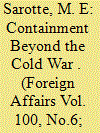

|
|
|
|
|
| Summary/Abstract |
On December 15, 1991, U.S.
Secretary ofState James Baker
arrived in Moscow amid
political chaos to meet with Russian
leader Boris Yeltsin, who was at the time
busy wresting power from his nemesis,
Soviet President Mikhail Gorbachev.
Yeltsin had recently made a shocking
announcement that he and the leaders of
Belarus and Ukraine were dismantling
the Soviet Union. Their motive was to
render Gorbachev impotent by transforming him from the head ofa massive
country into the president ofnothing.
|
|
|
|
|
|
|
|
|
|
|
|
|
|
|
|
| 14 |
ID:
118309
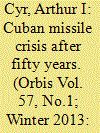

|
|
|
|
|
| Publication |
2013.
|
| Summary/Abstract |
The fiftieth anniversary of the October 1962 Cuban missile crisis is an appropriate time to review the events, which arguably were the closest the world has come to general nuclear war. The crisis was preceded by growing tensions between Moscow and Washington, and increasing Cuba emphasis in U.S. domestic politics. Analysts have differed on motives for trying to place long-range missiles in Cuba; Soviet officials consistently emphasized defense of Cuba. Revelations since the crisis indicate war was even closer than realized at the time. President John F. Kennedy deserves considerable credit for resisting military pressures.
The Cuban Missile Crisis of October 1962 arguably was the closest the world has come to nuclear war since the beginning of the nuclear era in 1945, and for that reason alone has been the focus of notable theatrical and literary products as well as scholarly analysis. The crisis has been described as President John F. Kennedy's "finest hour" in a touchingly brief tenure in the White House, and also as the direct result of weakness and miscalculation in the administration of that same American chief executive. Crisis management, a popular subject for analysis even before the crisis, received a major boost in visibility as a result of this unprecedented confrontation. The colorful personalities involved on both sides, including unpredictable Soviet Premier (Chairman of the Council of Ministers) Nikita Khrushchev, as well the photogenic and public relations-conscious U.S. leader, and some of their immediate advisers, have added to both human interest and dramatic potential. Finally, the crisis led to changes in strategic policies on the part of the United States and the Soviet Union, and their immediate allies. For these reasons and others, the half-century anniversary of the events merit a fresh look, both to review previous analyses and discuss lessons which bear on present-and future-international relations.1
The perceptions and conclusions among informed students of the Cuban Missile Crisis generally have shifted over the decades. At least in the United States, and among the international strategic studies community more generally, the initial reactions were generally laudatory of Kennedy and his men. Nuclear war had been avoided, while the goal of the removal of Soviet missiles from Cuba was achieved. Walt W. Rostow, a member of the Kennedy administration who later became national security adviser to President Lyndon B. Johnson, described the crisis as "the Gettysburg of the Cold War," a characteristic observation from this highly theoretical academic, but one which reflected wider sentiment. Later in the 1970s, as plots involving the U.S. government in efforts to assassinate Fidel Castro came to light, the Kennedy administration was regarded in a more critical light. During the same decade, information became public regarding JFK's reckless behavior in his personal life. That led at least some to analyze policies and politics of his administration with a much more critical perspective.2
|
|
|
|
|
|
|
|
|
|
|
|
|
|
|
|
| 15 |
ID:
097233


|
|
|
| 16 |
ID:
106726
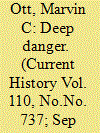

|
|
|
|
|
| Publication |
2011.
|
| Summary/Abstract |
The South China Sea is a growing focus of concern in Washington, at the headquarters of the US Pacific Command in Honolulu, and in a number of Southeast Asian capitals.
|
|
|
|
|
|
|
|
|
|
|
|
|
|
|
|
| 17 |
ID:
089279
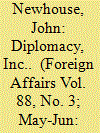

|
|
|
|
|
| Publication |
2009.
|
| Summary/Abstract |
The area around K Street in Washington, D.C., abounds with lobbyists, many of whom represent foreign governments or entities. Although some major foreign governments continue to work mainly through their embassies in Washington, nearly one hundred countries rely on lobbyists to protect and promote their interests. The subculture of public relations and law firms that do this kind of work reflects a steady decline and privatization of diplomacy -- with an increasing impact on how the United States conducts its own foreign policy.
|
|
|
|
|
|
|
|
|
|
|
|
|
|
|
|
| 18 |
ID:
099058
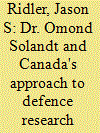

|
|
|
|
|
| Publication |
2010.
|
| Summary/Abstract |
During the early Cold War, Dr. Omond Solandt became Canada's leading defence research diplomat. As Chairman of the newly created Defence Research Board, Canada's first peacetime defence research organisation, Solandt established strong ties with Canada's senior allies, Great Britain and the United States, in the realm of military science and technology. His goal was to harmonise Canada's defence research agenda within this informal science alliance and to gain access to Allied scientific knowledge and technology. Solandt's efforts in maintaining strong and co-operative relations with London and Washington are examined, shedding light on the personal nature of Canada's efforts in the realm of defence research diplomacy, including within the controversial realms of biological warfare.
|
|
|
|
|
|
|
|
|
|
|
|
|
|
|
|
| 19 |
ID:
108629
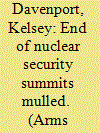

|
|
|
|
|
| Publication |
2011.
|
| Summary/Abstract |
The nuclear security summit process could end in 2014, a top adviser to President Barack Obama indicated last month.
In remarks at an Oct. 7 press briefing at the United Nations, Gary Samore noted that the first nuclear security summit, held in Washington in April 2010, endorsed the plan "to secure all vulnerable nuclear material around the world within four years," which Obama had announced a year earlier in a speech in Prague. "We do not intend to create a permanent institution with the nuclear security summit," said Samore, the White House coordinator for arms control and weapons of mass destruction (WMD) terrorism.
|
|
|
|
|
|
|
|
|
|
|
|
|
|
|
|
| 20 |
ID:
141542
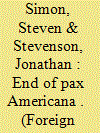

|
|
|
|
|
| Summary/Abstract |
STEVEN SIMON is a Visiting Lecturer at Dartmouth College and served as Senior Director for Middle Eastern and North African Affairs at the White House from 2011 through 2012. JONATHAN STEVENSON is Professor of Strategic Studies at the U.S. Naval War College and served as Director for Political-Military Affairs for the Middle East and North Africa on the U.S. National Security Council staff from 2011 to 2013.
|
|
|
|
|
|
|
|
|
|
|
|
|
|
|
|
|
|
|
|
|